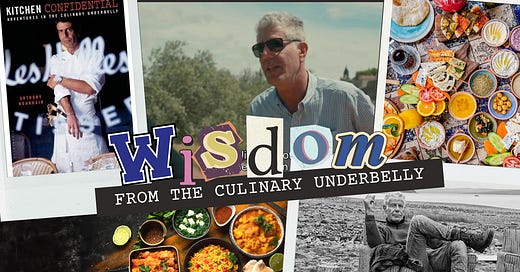Life According to Tony Bourdain
The Kitchen Confidential audiobook is more or less the exact driving distance between Charlotte & Virginia Beach
“If cooking is a variation of alchemy (and it is), then a service industry career is a portal to true wisdom.”
At the risk of becoming a Bourdain fan journal (which I’m not inherently opposed to), I’m once again dedicating this week’s think-piece to the greatest celebrity chef who ever lived.
For the last few weeks, I’ve been driving around the East Coast more or less looking for the next place that feels like home to me. And no one seemed more fitting to serve as spirit guide - willing or not - to the venture than Anthony Bourdain.
His image is no stranger to this publication, with his impact looming large in my life ever since my first Chicago industry gig pouring beer at a landmark brewery more than 10 years ago (shut up, it hasn’t been that long!!!).
With that in mind, I must confess the unimaginable.
I’d never read Kitchen Confidential up until a couple weeks ago.
And even then, I technically listened to Bourdain read the book to me. I laughed, I cried, I felt as though he were in my passenger seat monologuing to me directly. I can’t recommend that specific experience enough.
More broadly, though, it’s my firm belief that everyone should read and absorb Kitchen Confidential, regardless of their history working in food and restaurants.
If cooking is a variation of alchemy (and it is), then a service industry career is a portal to true wisdom. And herein lies a brief selection of proof points, courtesy of none other Anthony Bourdain.
The Wisdom of Kitchen Confidential
“Don't lie about it. You made a mistake. Admit it and move on. Just don't do it again. Ever”
The great paradox of the service industry is that the ego has both no place and a home within its confines. The kitchen door is generally the division of the ego’s domain: when facing outwards, we need to maintain a level of confidence, but among each other, we can’t afford to let ego block honesty and trust.
And the same goes for the rest of life.
Your ego isn’t something to be demonized; it’s a facet of yourself to be nurtured and worked with, rather than against. Learn when it’s helpful, and learn when it needs to take a backseat.
In the face of a mistake, quieting your ego is what will allow you to own up to it and learn from it. Tapping into your ego is what will allow you to integrate the lessons and move on.
“Assume the worst. About everybody. But don't let this poisoned outlook affect your job performance. Let it all roll off your back. Ignore it. Be amused by what you see and suspect. Just because someone you work with is a miserable, treacherous, self-serving, capricious and corrupt asshole shouldn't prevent you from enjoying their company, working with them or finding them entertaining.
Here is the one lesson (wisdom nugget?) that I’d amend ever so slightly: assuming the worst in the way described here is more of an extension of neutrality and detachment. Regardless of how an individual meets your expectations, this mindset is one of choosing to be entertained.
In the restaurant industry, you most certainly see the worst in people. Bourdain doesn’t mince words over this in his writings. Guests and colleagues alike will test your belief in the fundamental goodness of humanity. But the point here is that you get to choose how you’ll respond.
We’re not getting mad or lost in hurt. We’re moving forward and choosing to frame even the unfortunate happenings of life as at least entertaining.
“Good food is very often, even most often, simple food.”
This core tenet can be applied to more than just food: oftentimes, simple is best. Less is more.
Humans are already complex enough; we don’t need to overcomplicate the other facets of our lives.
“Skills can be taught. Character you either have or you don't have.”
This is one of my fundamental beliefs. Anyone can learn how to do anything (how good anyone can be at anything is a different story), but who we are is something else entirely.
At a macro level, character, values, and the care we take in and with our lives will always trump pure skills. There’s a baseline of aptitude that’s needed in certain contexts, of course.
But when push comes to shove and the stress is high, someone at the baseline but with strong character is far preferred to someone at the highest skill level but lacking in morals.
In fact, I’d argue that without character, the ceiling for skills attainable is lower.
Thanks, Chef. Thanks for continuing to journey with us <3










This is so good
i love you